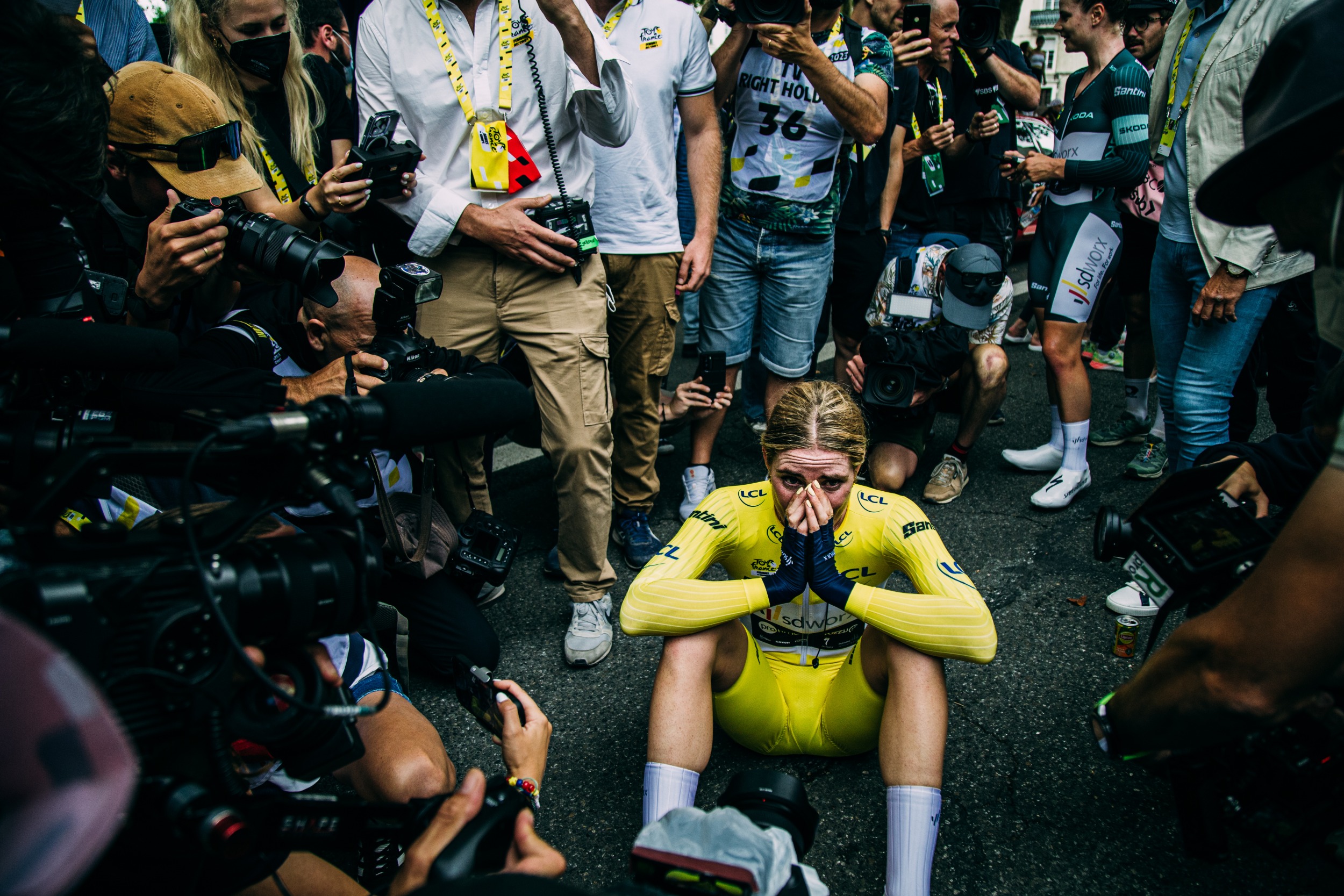

The Tour de France Femmes avec Zwift 2024 is a landmark event in the history of women’s cycling, running in 2024 from August 12 to August 18. This year’s race not only features a challenging and diverse route but also marks a milestone by starting outside of France for the first time, with the Grand Départ in Rotterdam, Netherlands. This decision underscores the global appeal and growing prestige of the event, reflecting its evolution from its revival in 2022 into a cornerstone of the Women’s WorldTour.
The race covers 946 kilometers over eight stages, offering a mix of flat sprints, a technical time trial, rolling hills, and grueling mountain ascents with the finale on the iconic Alpe d’Huez. This variety ensures that the Tour de France Femmes avec Zwift will test every aspect of a rider’s ability, from raw speed and power to climbing prowess.
History
The original women’s Tour de France began in 1984, running concurrently with the men’s race. American cyclist Marianne Martin won the inaugural edition. The race continued annually until 1989, facing numerous challenges that eventually led to its discontinuation. Despite the hiatus, the spirit of competition remained strong, with various other women’s cycling events attempting to fill the void. These included the Tour Cycliste Féminin and the Grande Boucle Féminine Internationale, which, although significant, could not match the prestige of the Tour de France.
The turning point came in 2014 with the creation of La Course by Le Tour de France. This one-day race was initiated after a successful petition led by prominent female cyclists, like Marianne Vos and after some successful editions, quickly evolved into a multi-day race. This evolution set the stage for the reintroduction of the Tour de France Femmes avec Zwift in 2022, a move that reignited the excitement and prestige of women’s stage racing. Annemiek van Vleuten won the first edition in its modern format, followed by Demi Vollering in 2023, both showcasing exceptional talent and determination.
Title sponsor Zwift is a firm believer of women’s cycling. Read our story on Zwift’s Kate Veronneau here: https://procyclingwomen.org/news/kate-veronneaus-zwift-voyage-into-the-world-of-womens-cycling/
The 2024 edition aims to build on this legacy, promising intense competition and unforgettable moments. With the race starting in the cycling haven of the Netherlands, passing through Belgium, and ending in the French Alps, it offers a route that celebrates the sport’s heritage while pushing its boundaries. Each stage is designed to highlight different aspects of racing, from flat-out sprints and time trials to the strategic battles of the mountains. This ensures that the overall winner will be a truly versatile rider, capable of excelling across various terrains and race situations.
The race’s significance extends beyond the competition itself. It represents a broader movement towards gender equality in sports, providing a platform for female cyclists to showcase their talents on a global stage. The involvement of cities like Rotterdam, The Hague, and Dordrecht in the Grand Départ emphasizes the communal support for women’s cycling and highlights the cultural integration of the sport within these regions. Initiatives associated with the race, such as community rides and educational programs, further the impact by encouraging broader participation and interest in cycling.
Stages
Stage 1: Rotterdam to The Hague (124 km)
The opening stage is a flat 124 km route, ideal for sprinters. Starting in Rotterdam, the course passes through Schiedam, Vlaardingen, and the picturesque Dutch lowlands before finishing in The Hague. The flat terrain and coastal route mean crosswinds could play a significant role, potentially causing echelons and splits in the peloton. Teams with strong sprinters will aim to control the race and set up for a fast finish in Kijkduin. Riders need to stay well-positioned to avoid losing time due to crashes or splits.
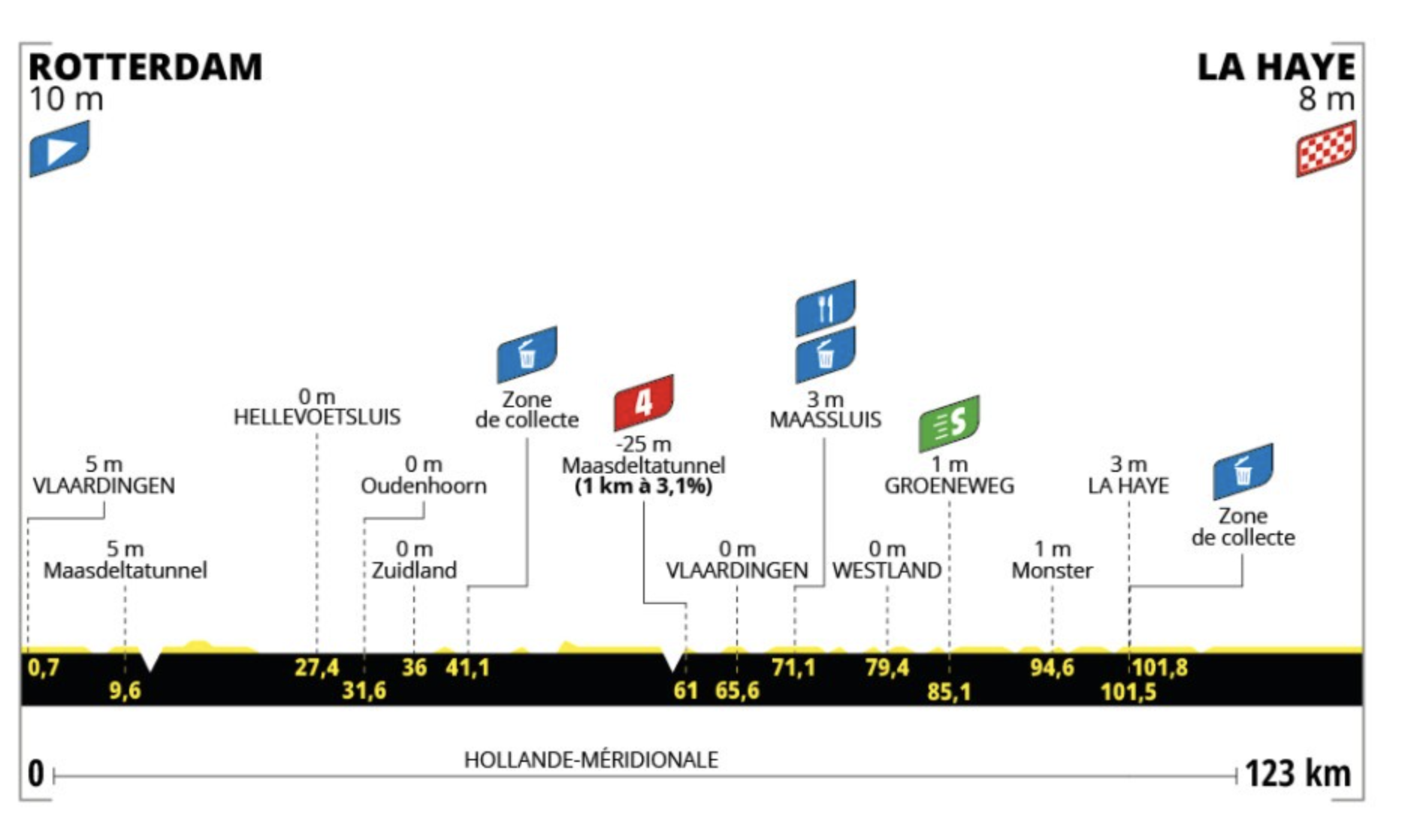
This stage will start at the Museumpark in Rotterdam, showcasing the city’s vibrant culture before the peloton heads out through urban and rural landscapes. The route includes key urban landmarks before transitioning into the Dutch countryside, where the infamous winds can wreak havoc. As the race approaches The Hague, the sprinters’ teams will ramp up the pace, setting the scene for a dramatic sprint finish by the North Sea.
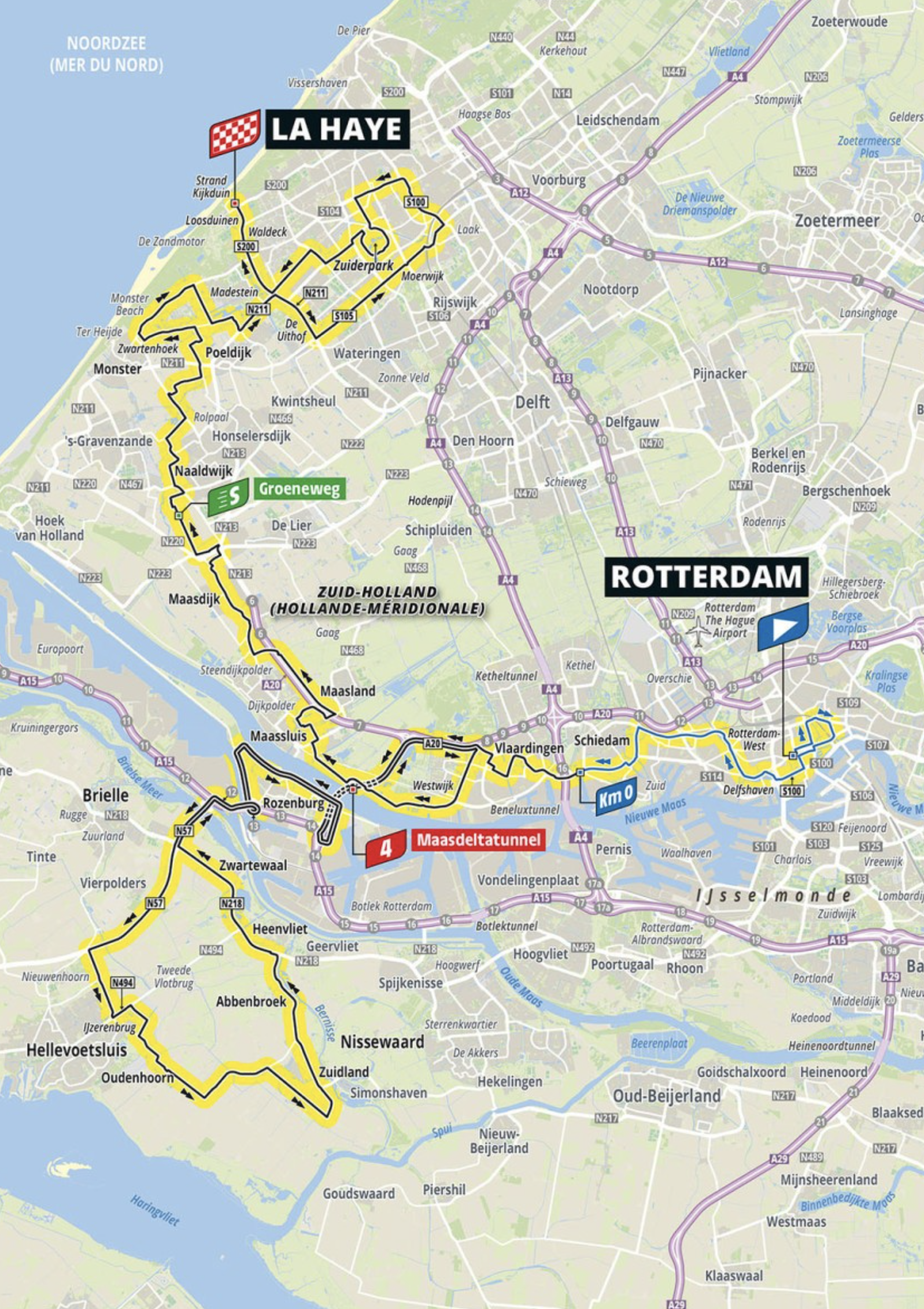
Stage 2: Dordrecht to Rotterdam (67 km)
The second stage is shorter, covering 67 km. It starts in Dordrecht and ends in Rotterdam, passing the iconic windmills of Kinderdijk. Riders must manage their energy carefully as they face an individual time trial in the afternoon. Sprinters’ teams will likely dominate, but breakaways could succeed if the peloton conserves energy for the time trial. The finish at the Erasmus Bridge involves technical sections that could favor riders with good bike-handling skills.
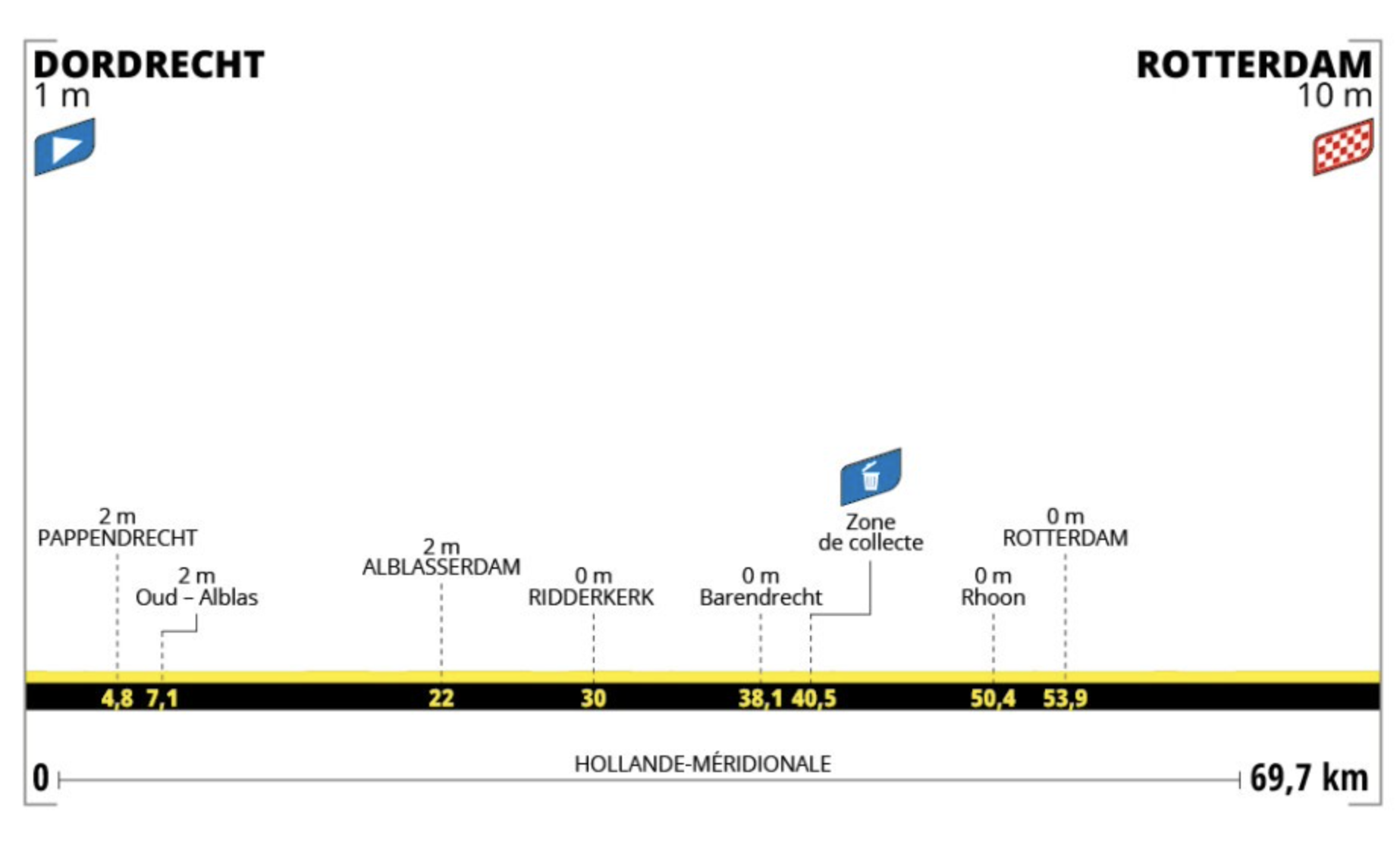
Starting at Energieplein in Dordrecht, the route takes the peloton through scenic areas renowned for their windmills and historical significance. The race will proceed towards Rotterdam, ending at the foot of the iconic Erasmus Bridge, where technical prowess will be crucial.
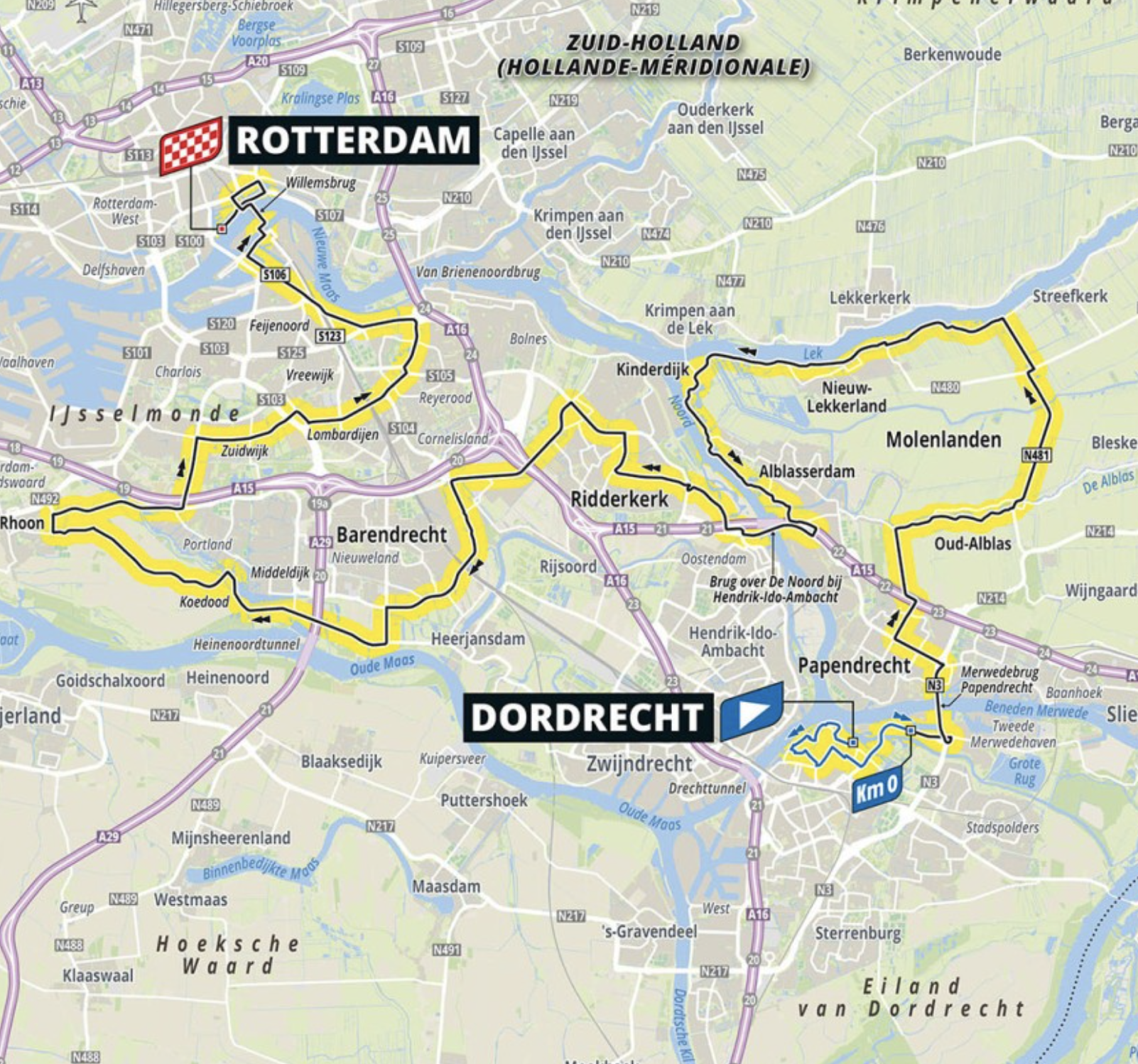
Stage 3: Rotterdam Individual Time Trial (6.3 km)
A short but intense 6.3 km time trial in Rotterdam, featuring flat and fast roads through the city. This stage will favor riders who can produce high power over short durations and who excel in pacing and cornering. Time gaps might be small, but every second counts in the overall classification. Wind conditions could affect performances, especially in an urban environment.
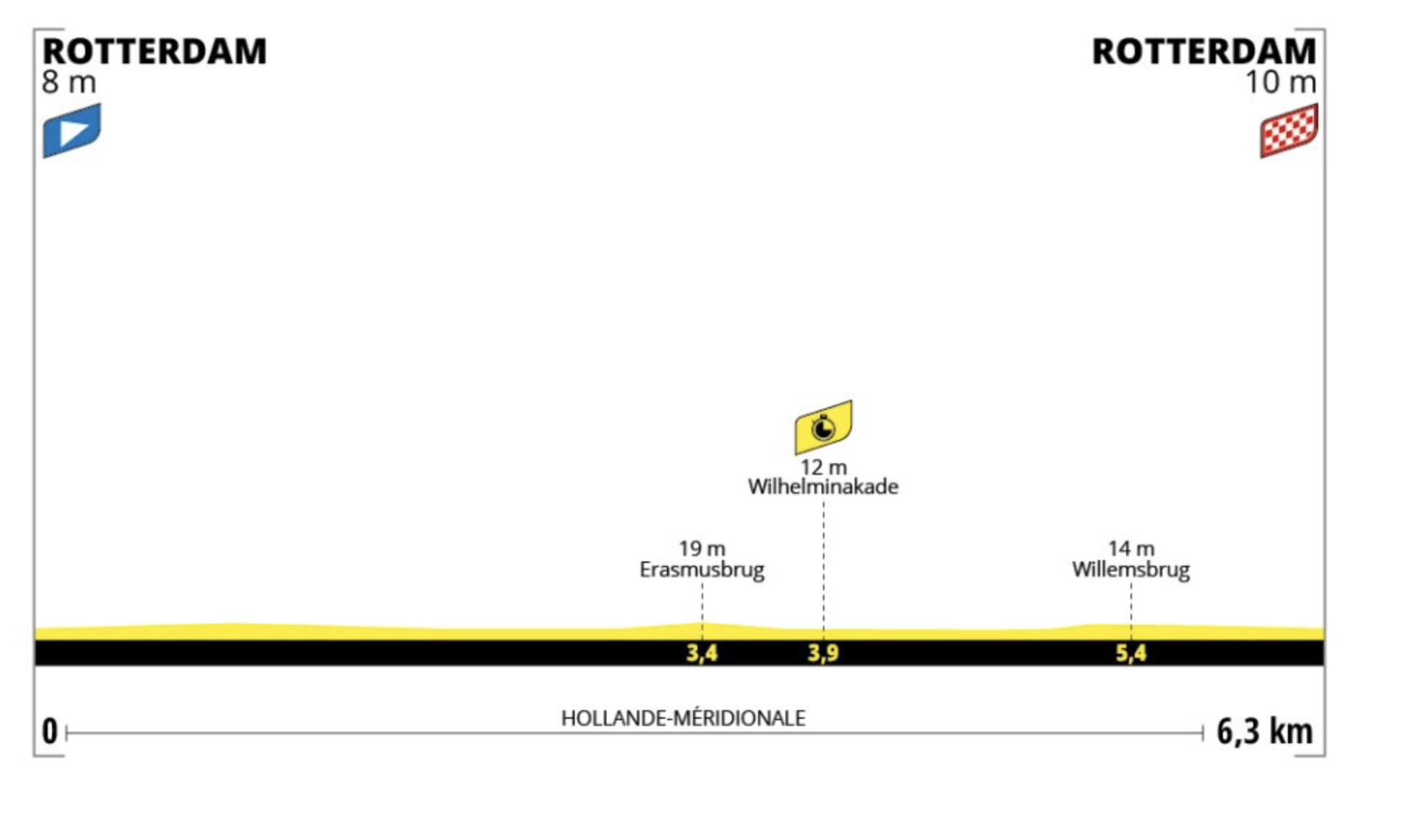
Starting at the Erasmus Bridge and looping through the city, the time trial will challenge riders’ abilities to maintain high speeds and navigate technical corners. The stage concludes back at the Erasmus Bridge, making it a crucial test for GC contenders early in the race.
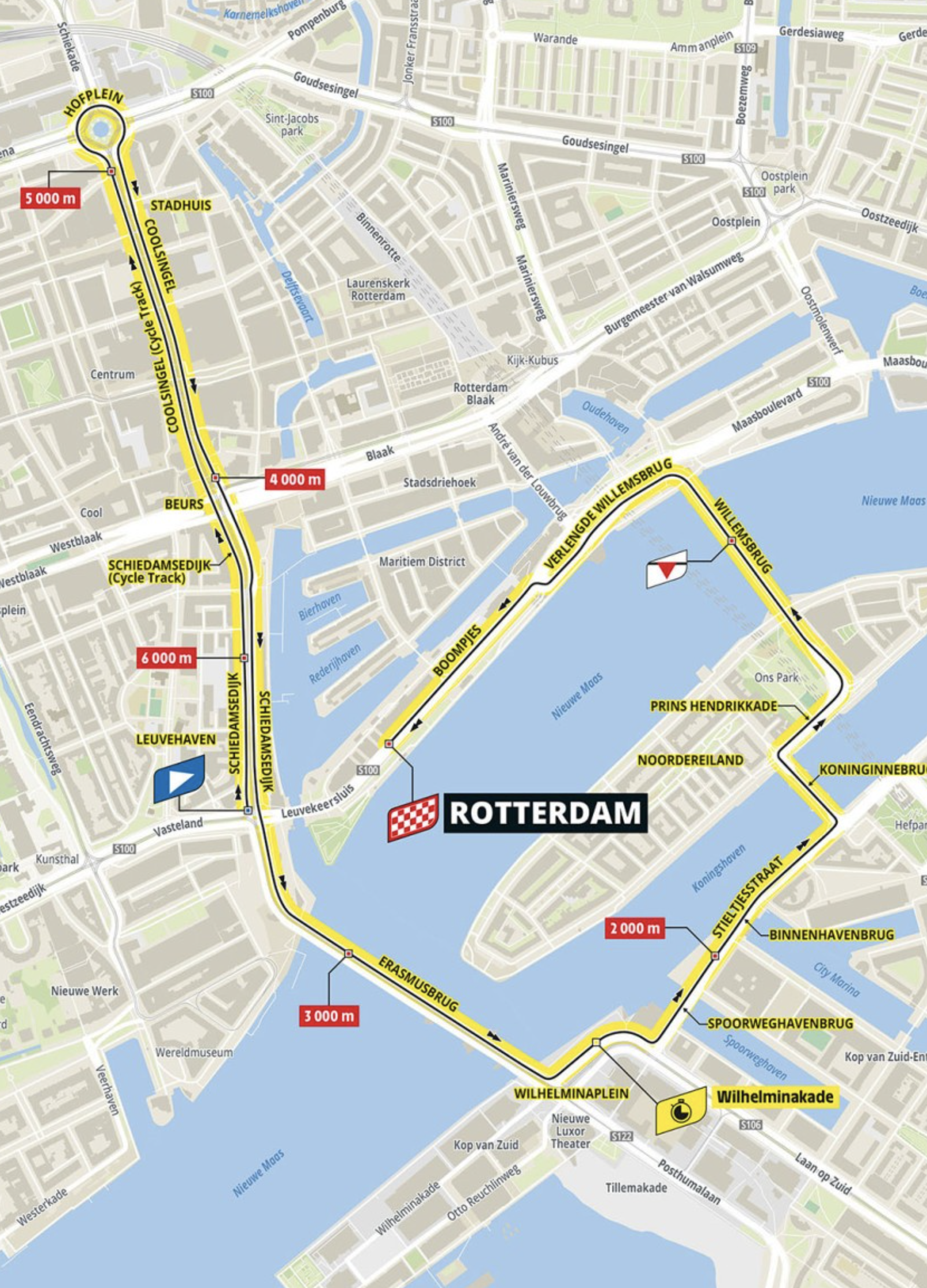
Stage 4: Valkenburg to Liège (122 km)
The race moves into Belgium with a hilly 122 km stage from Valkenburg to Liège, including multiple categorized climbs such as the Cauberg, Côte de la Redoute, and Côte de la Roche-aux-Faucons. Favoring punchy climbers and riders who can attack on the ascents. This stage is ripe for breakaway attempts, especially from riders looking to gain time before the mountains. Riders will need excellent bike-handling skills to navigate the descents.
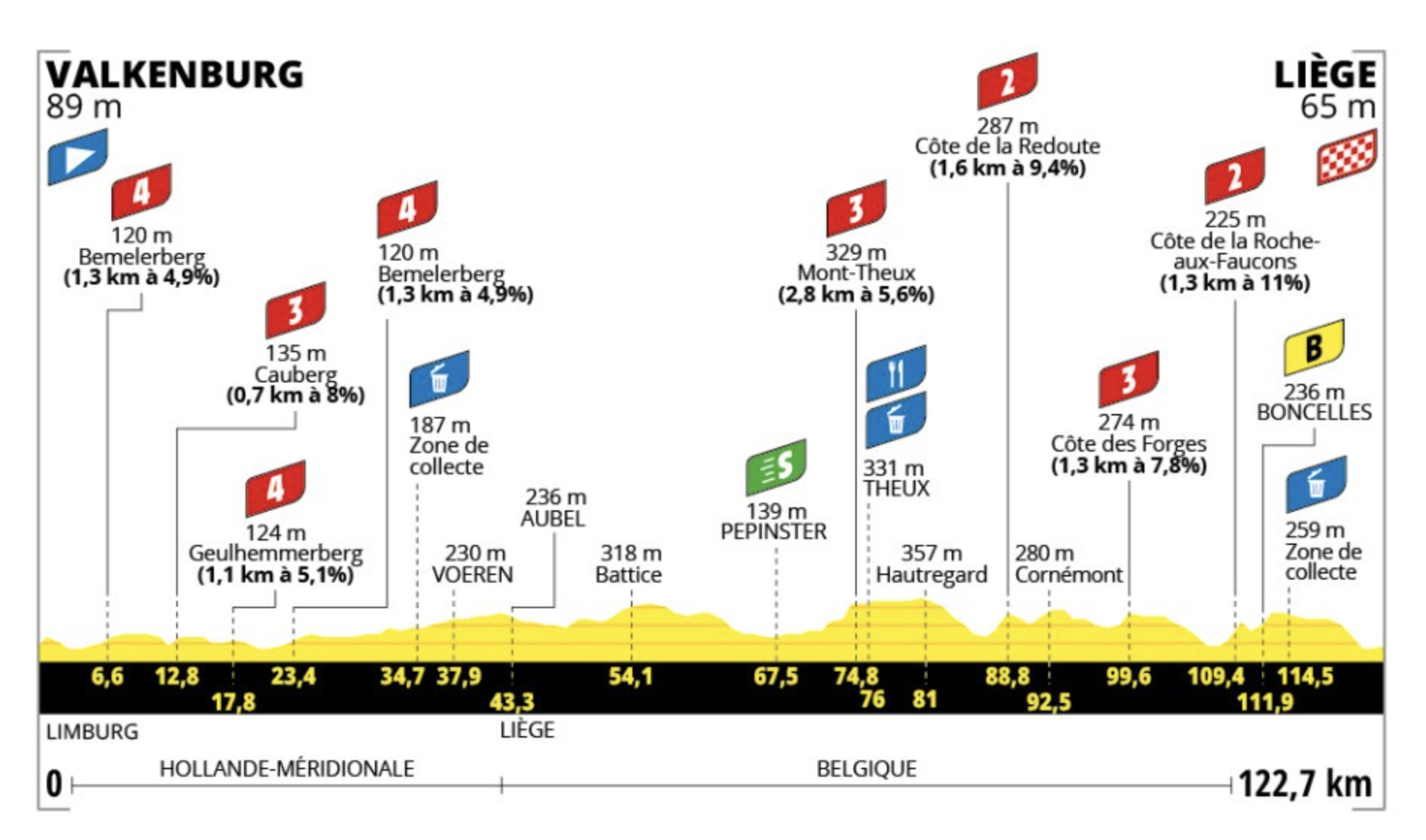
The stage is reminiscent of the Ardennes Classics, featuring climbs that are short but steep, making it a battleground for climbers and opportunists. The finish in Liège will likely see a reduced group sprint or a solo breakaway victory.
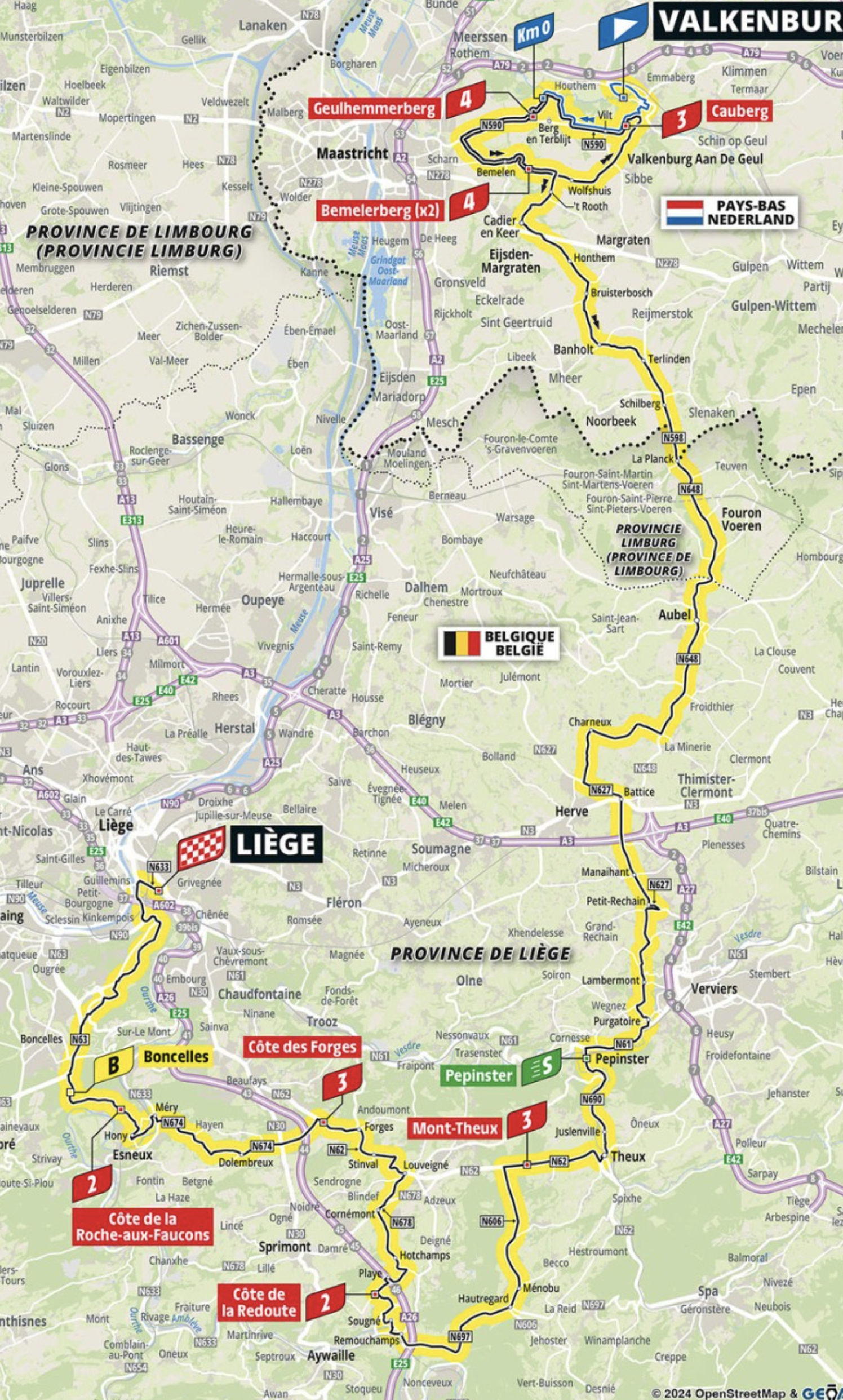
Stage 5: Bastogne to Amnéville (150 km)
This stage covers 150 km from Bastogne to Amnéville, featuring rolling hills that could suit breakaway specialists. Constant undulations will sap the energy of the peloton, making it hard to control the race. Riders looking to gain time on GC or stage hunters will aim to get into the breakaway. With tougher stages ahead, riders need to balance effort and recovery.
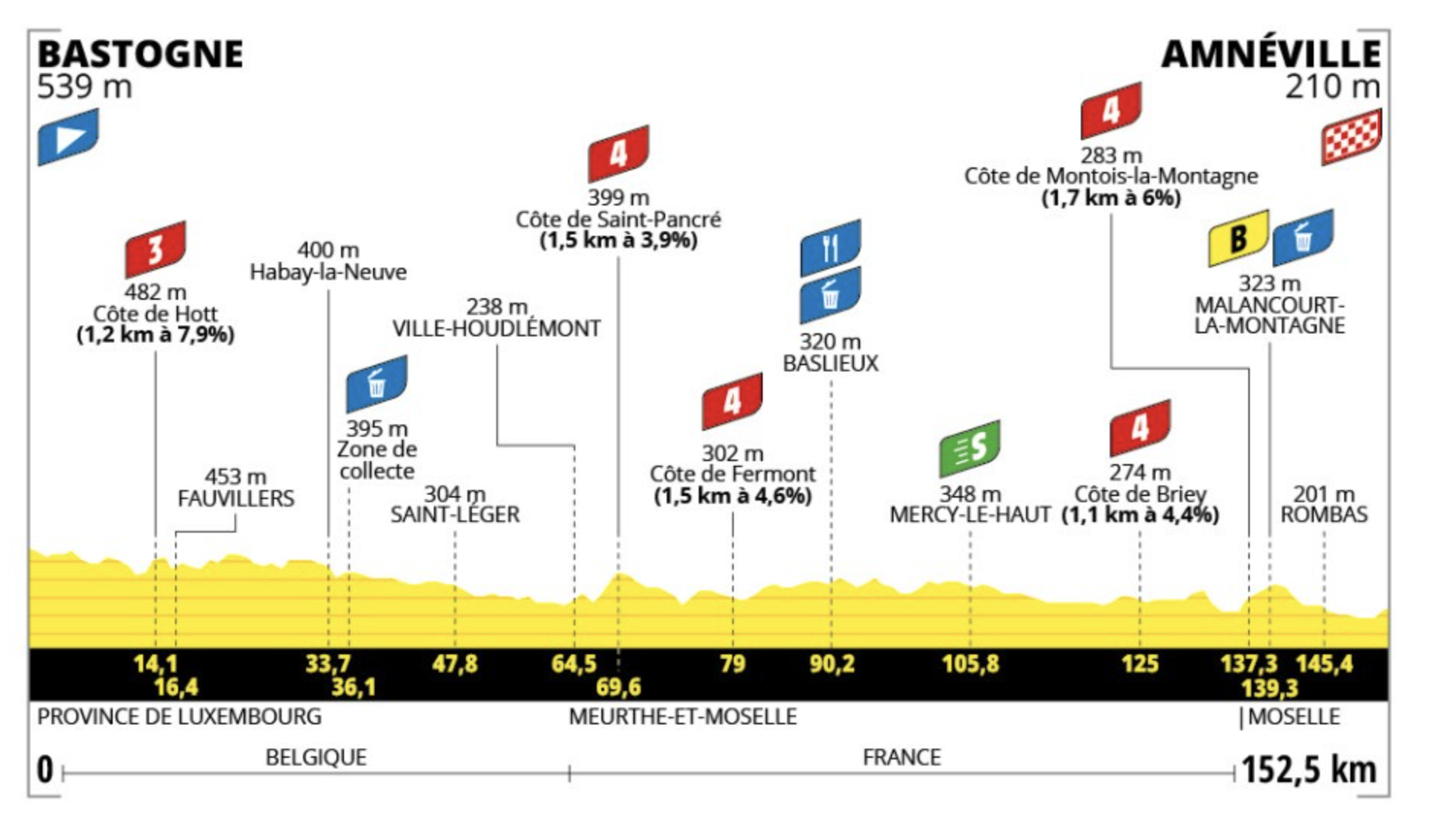
The route traverses the Ardennes, known for its rolling hills and scenic beauty. The finish in Amnéville will test the riders’ endurance and tactical acumen, providing opportunities for those daring enough to break away from the peloton.
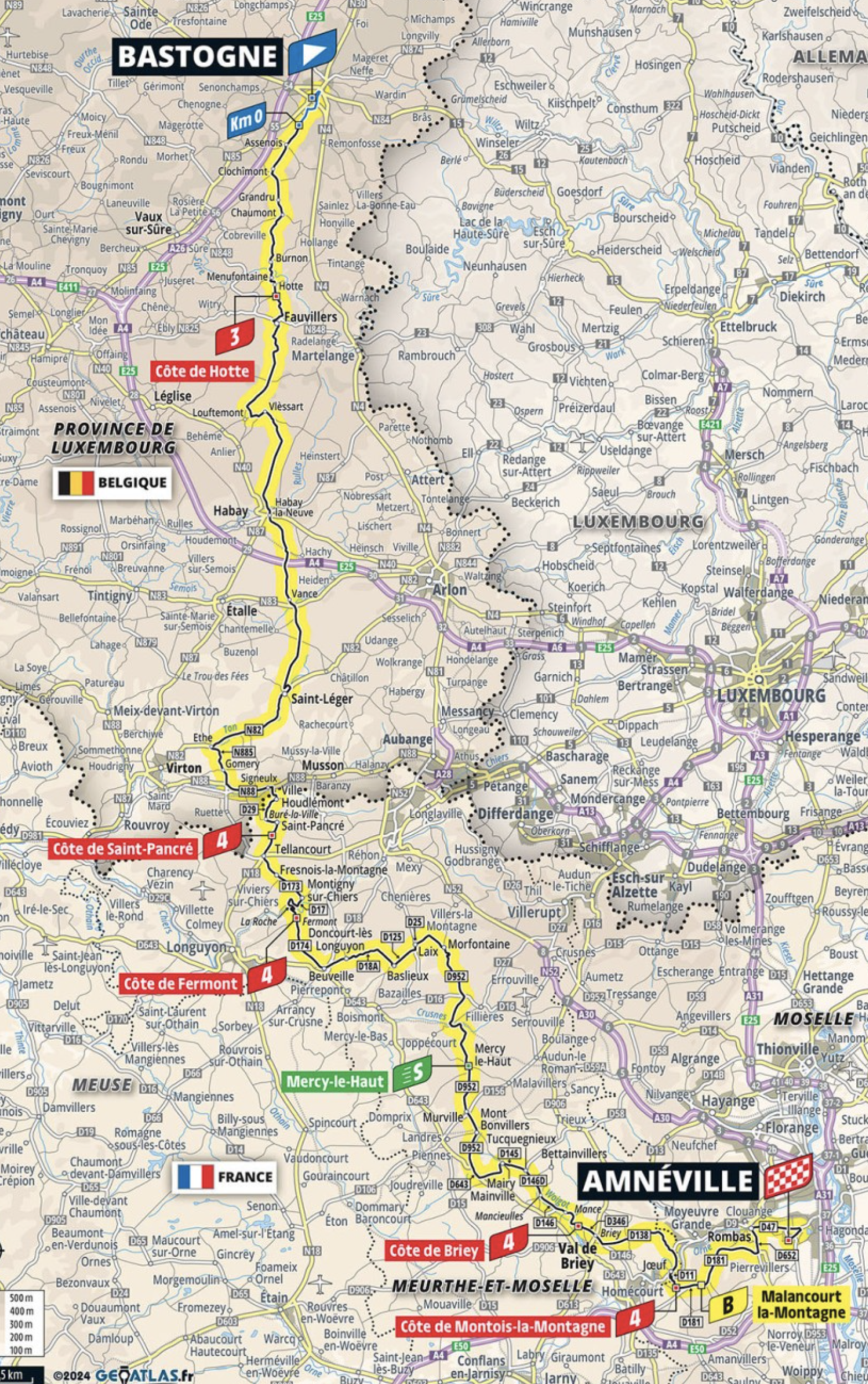
Stage 6: Remiremont to Morteau (160 km)
This 160 km stage features several categorized climbs, making it a key day for the GC contenders. Pure climbers will come to the fore, and GC contenders must stay vigilant. Expect multiple attacks on the climbs as riders try to gain time. Mountain weather can be unpredictable, potentially adding another layer of difficulty.
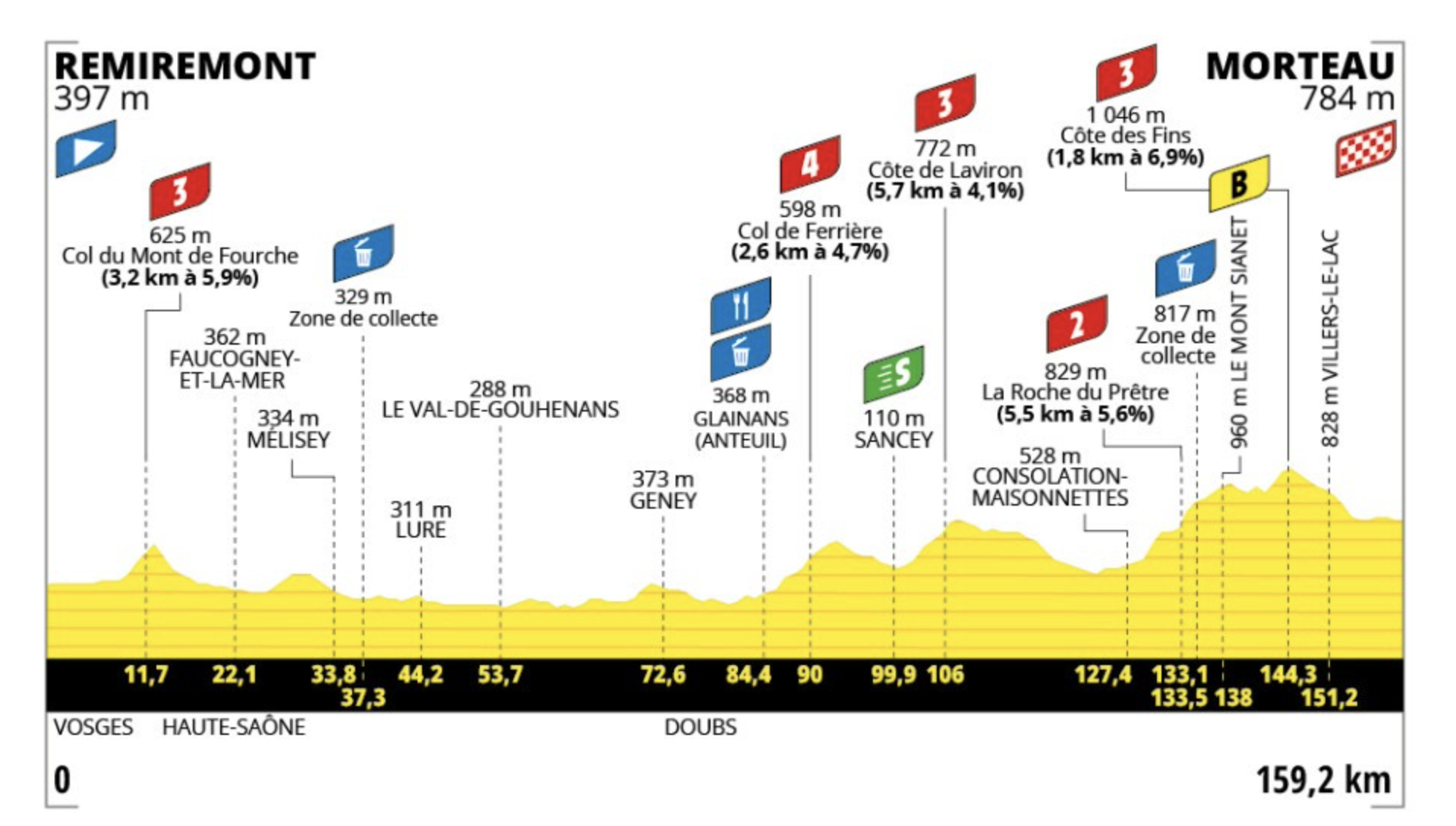
The stage offers a mix of mid-range climbs that could see breakaways succeed if the peloton allows. With the Alps on the horizon, riders will need to manage their efforts carefully to save energy for the decisive stages.
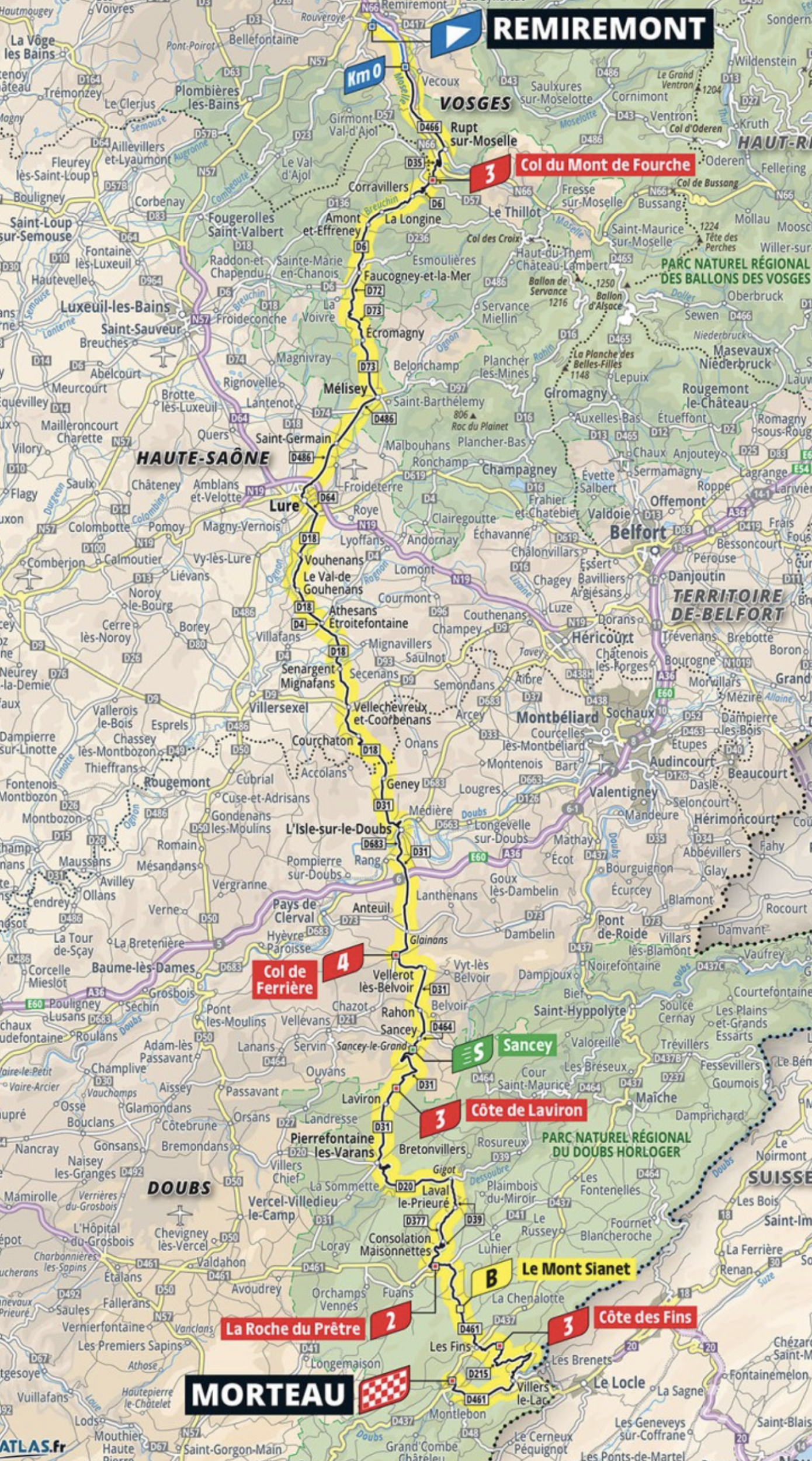
Stage 7: Champagnole to Le Grand-Bornand (167 km)
Featuring back-to-back climbs, this 167 km stage from Champagnole to Le Grand-Bornand is one of the most challenging. The climbs will sort out the GC contenders, and significant time gaps can occur. Strong team support will be crucial for GC contenders, particularly on the climbs. Riders need to manage their efforts carefully to avoid burning out before the final climb.
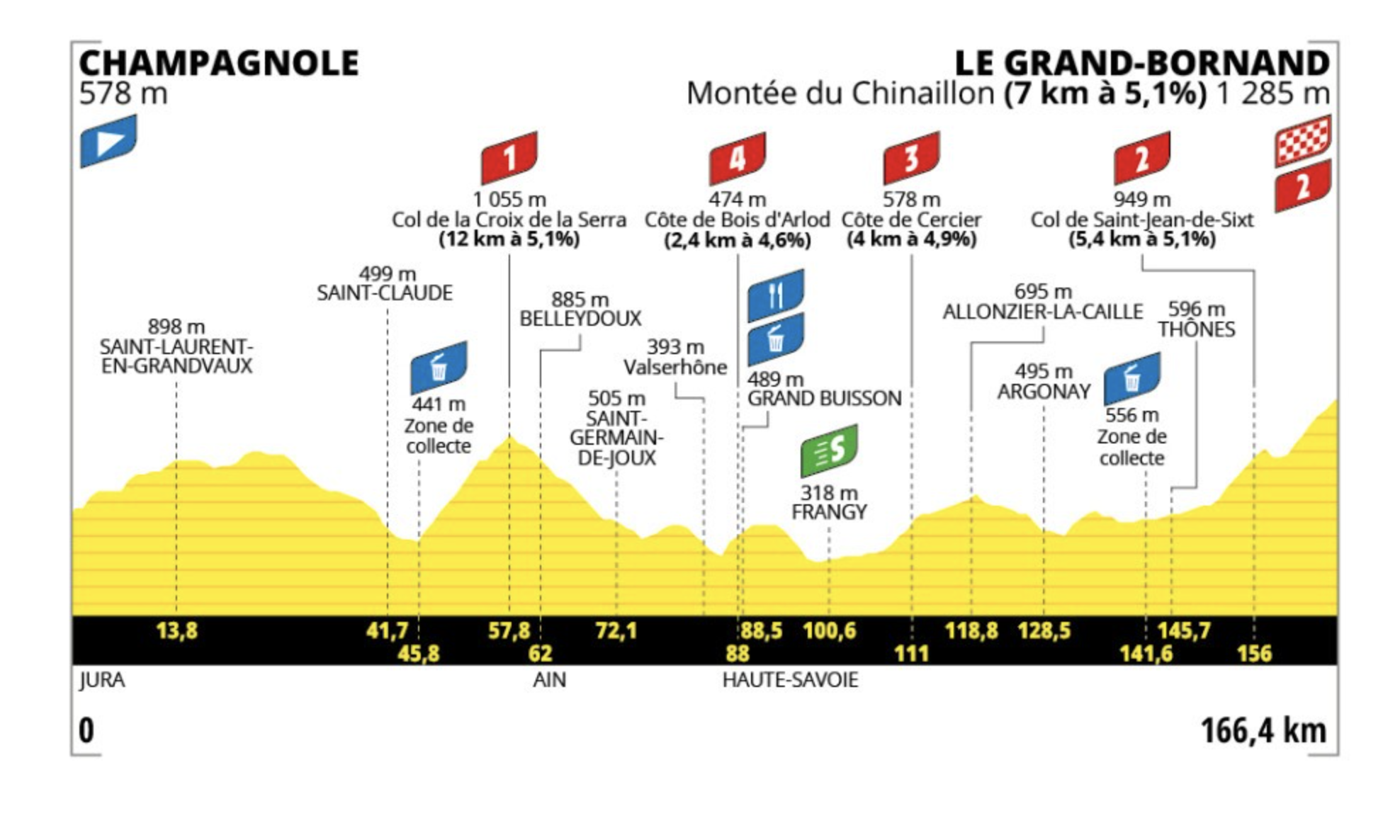
The stage includes significant ascents such as the Col de Saint-Jean-de-Sixt and Montée du Chinaillon, demanding both physical strength and strategic acumen from the riders.
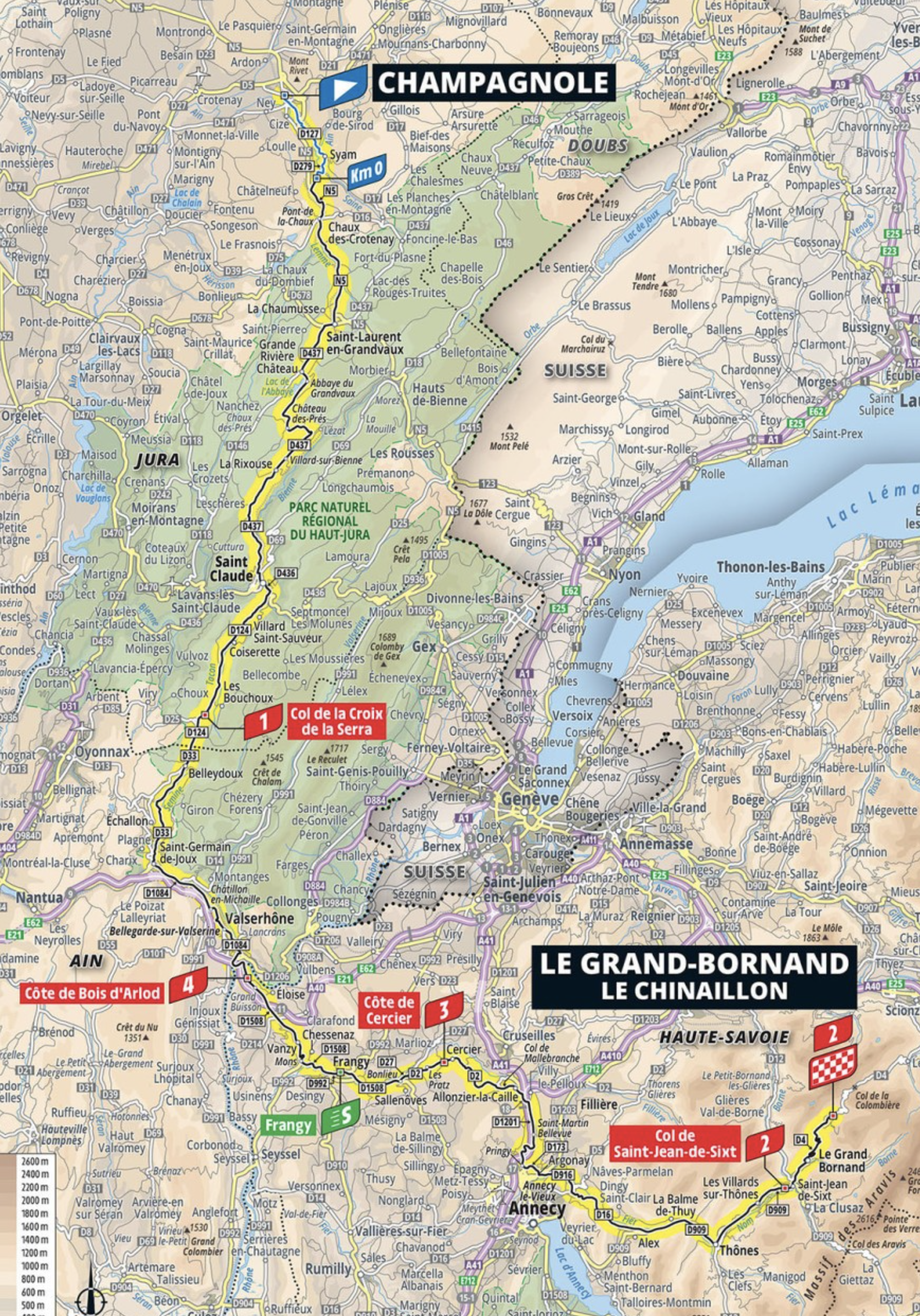
Stage 8: Le Grand-Bornand to Alpe d’Huez (150 km)
The final stage, a 150 km race to the legendary Alpe d’Huez, features one of the most iconic climbs in cycling with 21 hairpin bends. The Alpe d’Huez will be the ultimate test, with its 21 hairpin bends and steep gradients. This stage will likely decide the overall winner, with dramatic shifts in the GC expected. The climb will be packed with fans, creating an electric atmosphere that could inspire or intimidate riders.
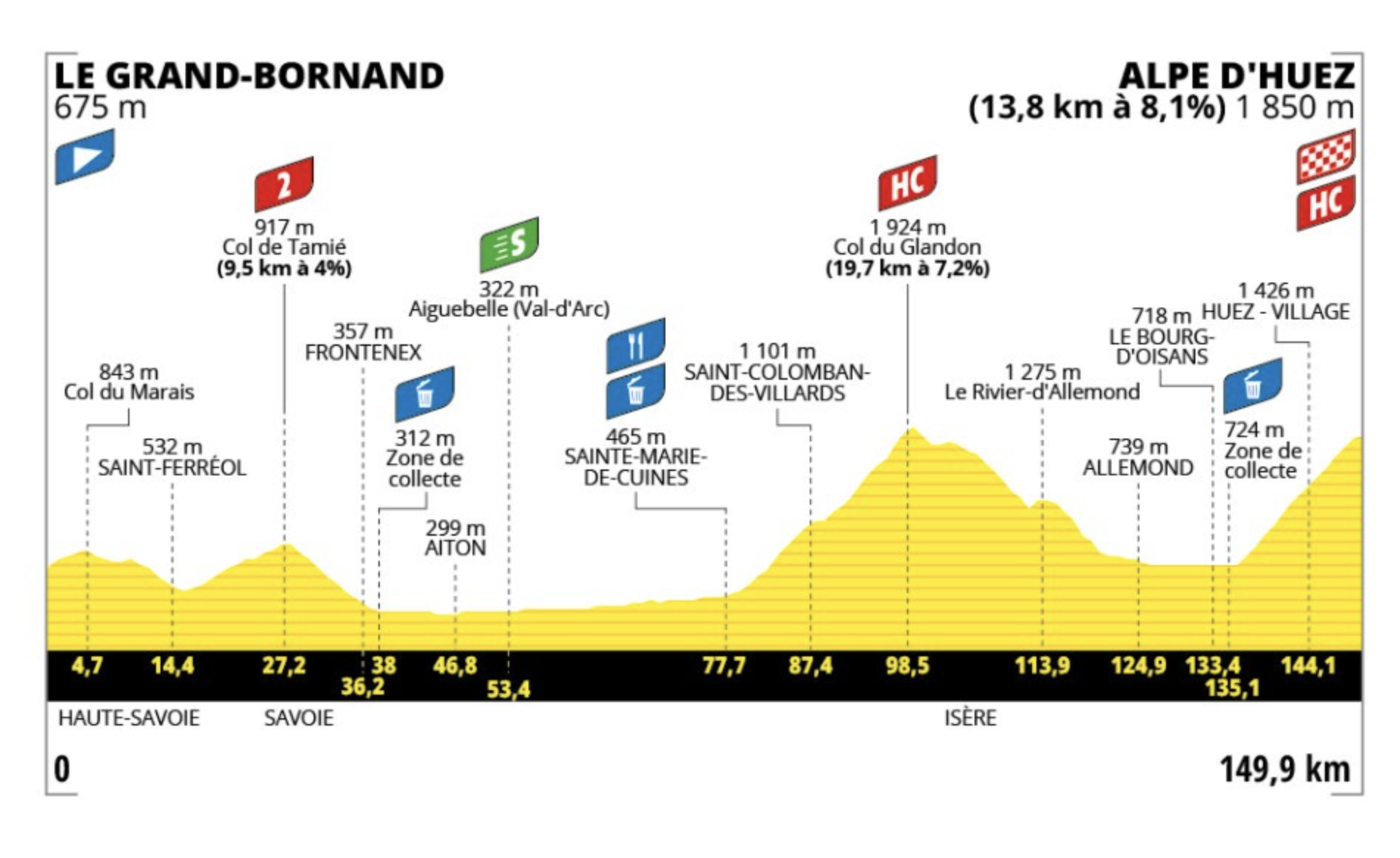
The final stage starts at Le Grand-Bornand and includes the daunting Col du Glandon before the climactic ascent to Alpe d’Huez. This legendary climb will be the ultimate proving ground for the GC contenders, ensuring a dramatic conclusion to the race.
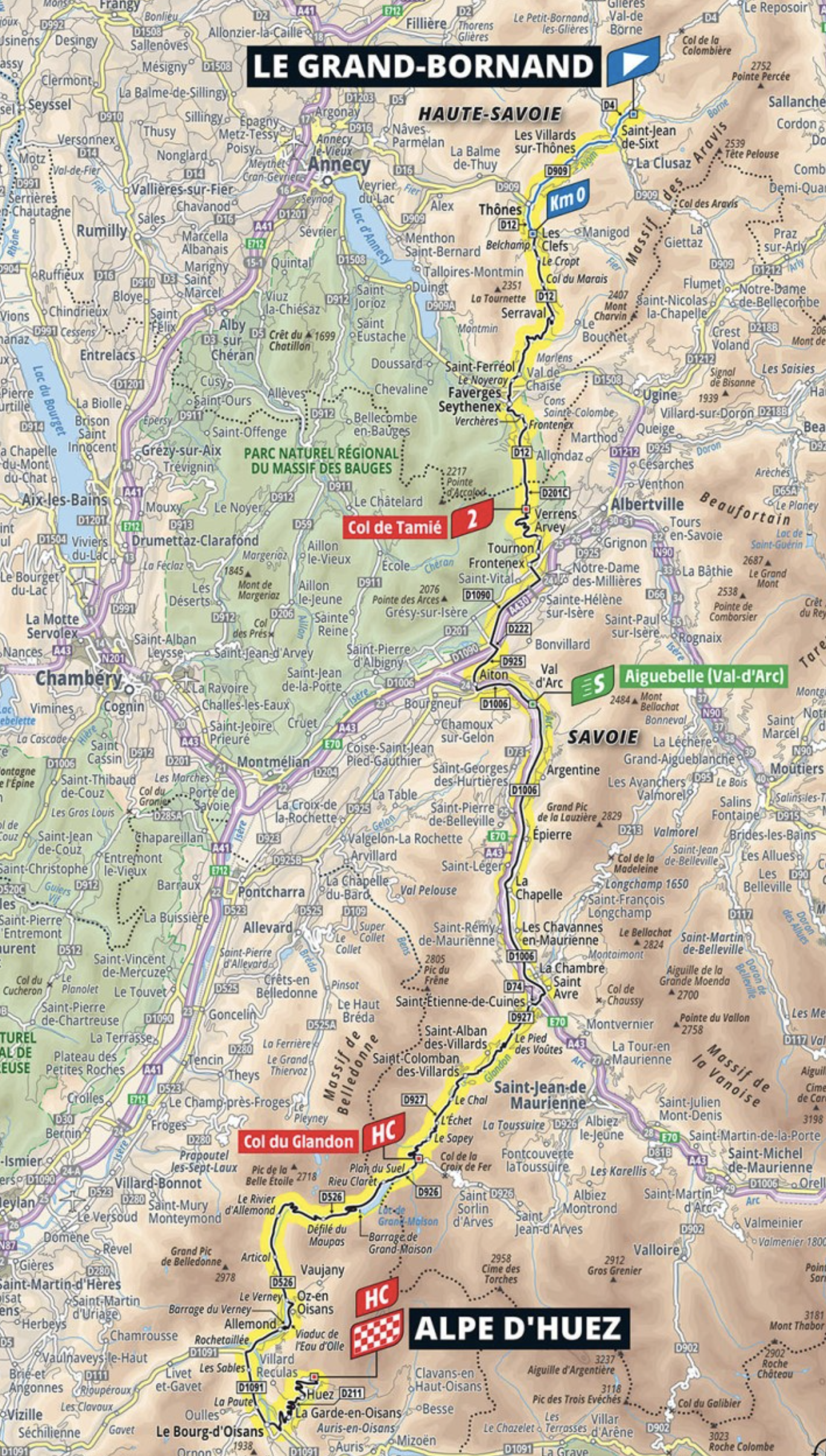
Key Contenders
Demi Vollering
Demi Vollering needs no introduction. The defending champion from 2023, rides for Team SD Worx-Protime and is the rider to beat. Her consistent performance across all terrains makes her a strong contender for back-to-back victories. Vollering’s familiarity with the Dutch roads from the Grand Départ will be an added advantage. The Dutch rider is one of the strongest climbers and will be keen to win the stage and the general classifications at the iconic Alpe d’Huez, where thousands of Dutch fans are expected.
Lorena Wiebes
Also from Team SD Worx- Protime is Lorena Wiebes. She missed the cut in the Olympic Games due to a crash in front of her and is now very hungry to take the first flat stages in The Netherlands to wear the yellow jersey in her home country, pretty close to her family house. The sprinter is currently the fastest one in the sprint and has a good chance for her yearly goal.
Charlotte Kool
Team DSM Firmenich- PostNL is trying to make te life of Wiebes harder in the sprint with their sprint cannon, Charlotte Kool. Kool, a former teammate of Wiebes, knows what it takes to win and is also very keen on getting that first yellow jersey on her shoulders in The Netherlands. With a good lead-out from Pfifer Georgi she has a fair chance!
Kasia Niewiadoma
The Polish rider who just extended her contract with Canyon//SRAM Racing, is one of the all-rounders in the peloton. Known for her exceptional climbing ability and aggressive racing style, Niewiadoma has consistently performed well in stage races and one-day classics alike. She strategically skipped the Giro d’Italia Donne this year to focus on the Tour de France Femmes, aiming to peak her form specifically for this event. Her strengths on the climbs and resilience in multi-day races make her a serious contender for the overall General Classification (GC). But don’t rule out Neve Bradbury, the Aussie rider did very well in the Giro d’Italia and could be an outsider for the podium as well.
Lidl-Trek
We mention the team her, because Lidl Trek brings a strong team to the start of the race. With Lucinda brand for the attacks and Gaia Realini AND Elisa Longo Borghini for the hard stages in the mountains and Shirin van Anrooij for the hills, race director Ina Yoko Teutenberg has some different cards to play. Elisa Longo Borghini of Lidl-Trek is one of the most experienced and accomplished riders in the women’s peloton at this moment. As the recent winner of the Giro d’Italia Donne, Longo Borghini brings a wealth of experience and tactical intelligence to the race. Her exceptional climbing skills, combined with her strong time trials, position her as a strong GC contender. Longo Borghini’s ability to handle pressure and perform consistently across different terrains makes her a formidable competitor in the Tour de France Femmes avec Zwift.
Marianne Vos
Known for her versatility, Marianne Vos is a threat in both sprint finishes and breakaway situations. Her experience and tactical acumen will be crucial in navigating the diverse challenges of the 2024 route. Although not the youngest rider in the peloton anymore, Vos knows how to pick her races and perform them to the outmost perfection. Vos is always a rider to look at. Het palmares makes her one of the ambassadors for women’s cycling and there is no one who doesn’t want the sympathic Dutch rider to win a stage or win a jersey.
Evita Muzic
Evita Muzic, a French rider and key rider for FDJ-SUEZ, has been making significant strides in the women’s peloton. Known for her consistency, Muzic has emerged as a reliable performer in stage races. Her ability to endure tough stages and support her team leaders will be crucial. In the 2024 edition, she is expected to play a dual role, both as a GC hopeful and a crucial domestique for her team. Muzic’s capacity to shine in the mountains will be particularly valuable in the latter stages of the tour, where the climbs become more decisive. She hasn’t been the top of the top yet but show progress every year. This might be the year for her.
These riders, with their unique strengths and strategic approaches, will undoubtedly make the 2024 Tour de France Femmes avec Zwift an exciting and fiercely contested race. Each contender brings a blend of experience, talent, and determination, promising thrilling battles across all stages of the tour.
Follow the race with tracking in our app and on our website!